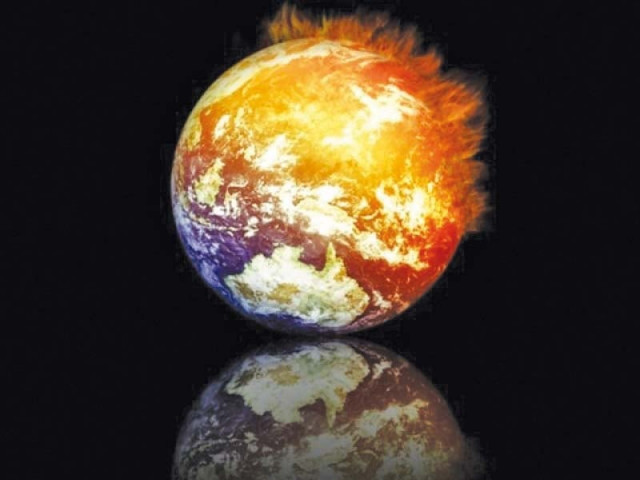Competitive advantage: ‘Sustainability’ the way forward for companies
Drastic climatic changes pushing us to rethink business models

Globally averaged temperatures over both land and ocean surfaces between January and June of year 2015, were the hottest on record since 1880, said NOAA data. PHOTO: FILE
You needn’t worry about having to toughen up because you can’t seem to bear the heat the way you could as a child.
The earth is getting hotter. Hotter than it’s ever been in 136 years of record keeping.
The World Meteorological Organisation (WMO) stated that “the average temperature for the six-month period was 0.85°C above the 20th century average of 15.5°C” – June 21. This surpassed the previous record set five years ago in 2010, by 0.09°C.
The US National Oceanic and Atmospheric Administration (NOAA) also released fresh data last week: globally averaged temperatures over both land and ocean surfaces between January and June of this year, 2015, were the hottest on record - since 1880.
The NOAA Global Analysis for June 2015 also stated that the period July 2014–June 2015 was ‘the warmest 12-month period in the 136-year period of record, surpassing the previous record set just last month’ (in the June 2014–May 2015 period).
Wish you could say the same about your sales or profit data too?
The Tides Can Keep Up
The Arctic ice is not one to be out-done: The average Arctic sea ice extent for June 2015 was 7.7% below the 1981-2010 average, at 350,000 miles. Interestingly, this is 60,000 miles larger than the smallest June sea ice extent recorded – also five years ago in 2010.
Nature, you’ll find, has a way of finding a balance. While the Arctic ice extent was 7.7% below, the Antarctic sea ice extent was 7.2% above the same 1981-2010 period average at 380,000 miles this June. This made it the largest ever Antarctic sea ice extent for the month of June.
Silent catastrophes
“Heat waves are a dangerous natural hazard, and one that requires increased attention,” said WMO’s Climate Prediction and Adaptation Branch Director Maxx Dilley and WHO’s Department of Public Health, Environmental and Social Determinants of Health Director Maria Neira, as quoted by the Inter Press Service.
“They lack the spectacular and sudden violence of other hazards, such as tropical cyclones or flash floods but the consequences can be severe.”
What Accountability Has to Do with Climate Change
All this is rather uncomfortably close to home.
In Pakistan, the masses know only too well the catastrophic consequences of the heat waves: the vast majority somehow survives without generators to plug the gaping gaps left by electricity providers in the misleading name of ‘load-shedding’ or home-based wells to draw directly from the water table.
Well over 1,200 people perished in the month of June alone in Pakistan from its most recent heat wave. Of these poor souls, the overwhelming majority were from the financially poor – those who had little choice but to remain outdoors despite government warnings to stay indoors.
Even when the infrastructure doesn’t experience the increased strain of natural catastrophes such as flooding or heatwaves, basics such as electricity, water or public transportation have become akin to luxuries – accessible primarily to those who can invest in their own personal infrastructure: multi-car family homes complete with industrial generators and tube wells.
The onus lies not with the widely predicted, time-honoured cycle of climate change, but with those snuggling seats of power, bearing the responsibility of providing the people who voted them with the basics of even semi-modern living.
How does this impact business
How do you define basic human work conditions? Are your employees working within an ethical work environment? Could you work for an eight hour shifts in your own factory, no matter what the time of day or season?
Are your employees compensated with hardship bonuses for continuing to work through severe circumstances?
Are they paid living wages, not just minimum wage?
Are people along your supply chain truly an inclusive part of your success – in both attaining and enjoying your success? Particularly upstream supply chains members, who often toil regardless of the weather, such as farming communities in the supply chains of textile and food manufacturers.
Call to Sustain-ovation
And beyond inclusivity and fairness of your most-at-risk core stakeholder group, lies a much deeper awakening:
“Sustainability should be a touchstone for all innovation,” Harvard Business Review said, 6 long years ago. “In the future, only companies that make sustainability a goal will achieve competitive advantage. That means rethinking business models as well as products, technologies, and processes.”
The writer is a leading sustainability specialist and winner of both the CSR Europe and CNN Young Journalist awards
Published in The Express Tribune, July 27th, 2015.
Like Business on Facebook, follow @TribuneBiz on Twitter to stay informed and join in the conversation.



















COMMENTS
Comments are moderated and generally will be posted if they are on-topic and not abusive.
For more information, please see our Comments FAQ